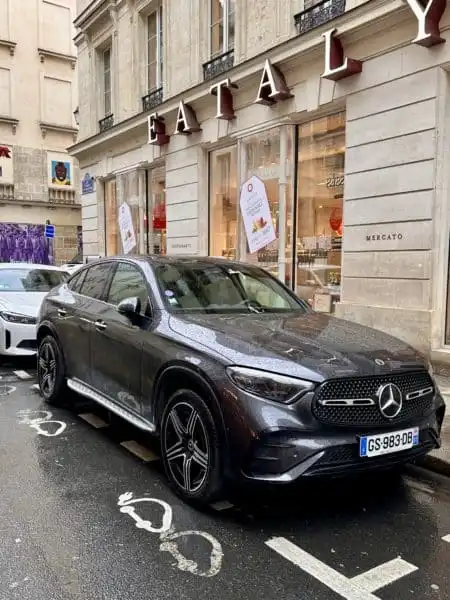Parisians vote to triple parking fees for big S.U.V.s and other hefty cars.

The city authorities say that large cars pollute more and are dangerous for pedestrians. Opponents say the mayor is on a crusade against motorists.
Voters in Paris have approved an effort to drastically increase parking fees for large sport utility vehicles and other heavy cars, the latest move by Mayor Anne Hidalgo to reshape the French capital with environmentally conscious and pedestrian-friendly policies.
The new parking fees are expected to be approved in May by the Paris City Council, where Ms. Hidalgo’s Socialist Party and Green allies have a majority. The new fees are then expected to come into effect in September, Ms. Hidalgo said.
Some car owners have complained that they are being shut out of the capital, but Ms. Hidalgo was unrepentant at a news conference on Sunday night. “Parisians made a clear choice,” she said, adding that, “We are very proud of this result.”
Still, turnout was extremely low. While some 54.5 percent of Parisians voted in favor of the measure, only about 5.7 percent of eligible voters went to the polls.

Although much of the public debate was focused on S.U.V.s, or sport utility vehicles, the new fees will apply to all cars that weigh more than 1.6 metric tons if they have traditional combustion engines or are hybrids, or more than two metric tons if they are electric.
People with those vehicles will have to pay 18 euros, a little more than $19, for the first hour of public parking in central Paris, and 12 euros in the French capital’s outer neighborhoods — triple the normal rate. For additional hours, prices rise sharply, so drivers of S.U.V.-like vehicles will end up paying more than $240 for six hours of parking in central Paris, instead of around $80 for regular cars.
But there are several exemptions, so the measure will mostly apply to outside visitors.
Paris residents who park in their neighborhood will not be affected. Neither will taxis or other professional vehicles, or people who use larger vehicles because of a disability.
The city authorities had argued that big S.U.V.s and other large cars emit more greenhouse gases than average cars and are more dangerous for pedestrians because of their bulkiness, citing a report that suggests that pedestrians are twice as likely to be killed in a collision with an S.U.V. than with a standard vehicle.

The referendum on parking fees was the second time in recent months that Ms. Hidalgo had sought direct popular approval for policies that are intended to make the city more appealing to pedestrians and cyclists.
In April, Parisians voted to ban rental electric scooters from the streets of the French capital, a measure that went into effect in September after complaints that they were essentially taking over the sidewalks.
As mayor since 2014, Ms. Hidalgo has pushed to make the capital less car-centric, closing off roads along some Seine River banks to motorized vehicles and significantly expanding the number of bicycle lanes.
Paris is served by a dense network of subways and buses, although the Olympic Games this summer, which are expected to attract millions of visitors, could seriously test the capital’s transportation.
The city authorities had said before the vote on Sunday that while the number of car owners and cars in the capital had steadily decreased over the past decade, the average car size had increased.
The city cited a 2020 report by the World Wide Fund for Nature that said that the trend toward bigger cars was threatening France’s climate goals.
David Belliard, the deputy mayor in charge of transportation in Paris, said the referendum was proof that despite pushing for “unpopular” measures like higher parking fees, “when you encourage debate, when you try to explain, you end up with decisions that are in favor of the climate, of the environment, and of health.”
S.U.V.s have grown increasingly popular around the world, a trend that experts say is a roadblock toward efforts to fight climate change because they tend to be less fuel-efficient than smaller cars.
The International Energy Agency, the world’s leading energy agency, said in an analysis last year that carbon dioxide emissions from S.U.V.s worldwide had reached nearly one billion metric tons in 2022, despite the growing popularity of electric models.
But Ms. Hidalgo’s opponents — motorist groups, and her centrist and right-wing political opponents on the City Council — complained that the debate was skewed.
On Sunday, voters were asked if they were “against the creation of a specific parking rate for heavy, cumbersome, polluting private cars?”
“Given how biased the question was, the result is a snub for the mayor,” said Philippe Nozière, the president of 40 Million Motorists, a motorist lobbying group.
Mr. Nozière said the new fees would unfairly affect tourists, residents of the capital’s suburbs and Parisian families. Sport utility vehicles and similar crossover cars have only become more popular because of increasing safety norms, he said.
“Ms. Hidalgo doesn’t want any more cars in Paris,” Mr. Nozière said. “In that case, she should just come out and say it.”
The referendum showed a clear divide in Paris between the capital’s wealthier western neighborhoods, which mostly voted against the new parking fees, and the city’s more working-class and socially diverse eastern ones, which mostly voted in favor.
Mr. Belliard, the deputy mayor, said that roughly 10 to 15 percent of the cars that currently circulate in Paris would be affected by the increased parking fees. He acknowledged that some recently manufactured S.U.V.s were less polluting than smaller, older cars. But he argued that automakers should be encouraged to use fewer resources, not more.
“If you build bigger, heavier vehicles, you need more materials and more energy than to build lighter ones,” he said. “You have to look at the issue in its entirety.”
Contact Paris Property Group to learn more about buying or selling property in Paris.


Social Cookies
Social Cookies are used to enable you to share pages and content you find interesting throughout the website through third-party social networking or other websites (including, potentially for advertising purposes related to social networking).